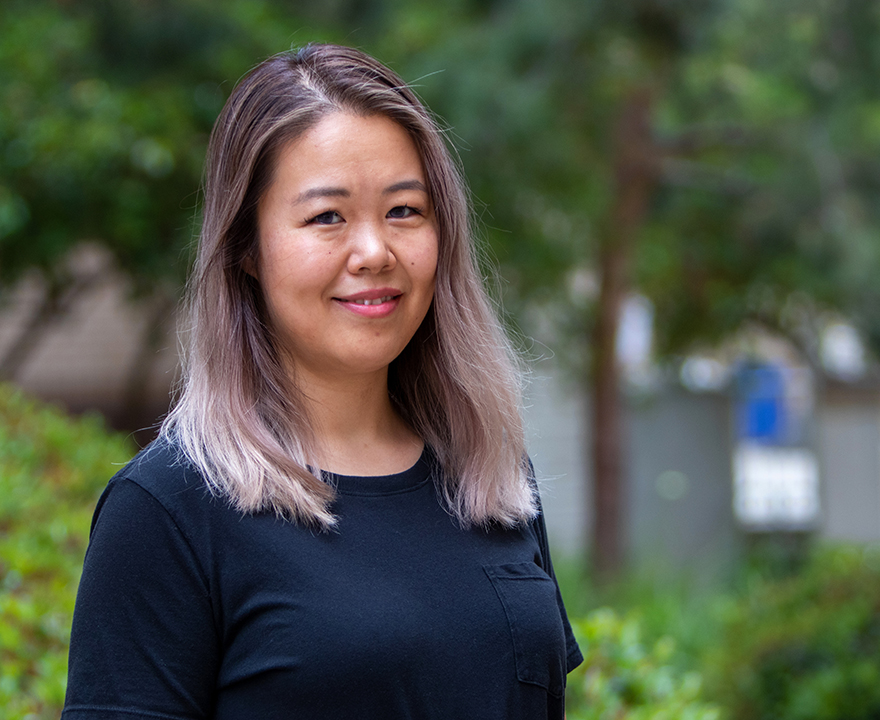Soc sci shoutout: Jing Zhang, cognitive sciences Ph.D. 2023

Soc sci shoutout: Jing Zhang, cognitive sciences Ph.D. 2023
- May 17, 2023
- After her grad ceremony in June, Zhang will be headed to Harvard as a postdoc
-----
As a graduate student in cognitive sciences at UCI, Jing Zhang, ’23 Ph.D., studied alongside cognitive sciences professor Sara Mednick in the Sleep and Cognition Lab. There, Zhang learned how to use innovative brain-imaging tools while working on cutting-edge sleep and cognition research funded by the National Institutes of Health (NIH), UCI MIND, and Office of Naval Research. In the fall, Zhang will be heading to Harvard Medical School as a postdoctoral research fellow. As her time as an Anteater comes to a close, she took a moment to reflect on the critical role UCI has played in shaping her as a person and a scientist.
What made you decide on cognitive sciences as a field of study? What interests you most about your work?
Reading The Man Who Mistook His Wife for a Hat by Oliver Sacks got me interested in the human brain and different neurological conditions. Then, a conversation in college with friends made me realize that people dream so differently – one of my friends always had animated dreams – which was super fascinating to me, and it started my journey in studying sleep.
I’ve always been fascinated by how the mind works and different states of consciousness. When I was an undergrad, I had a chance to conduct research on sleep and memory and fell in love with the field. It’s particularly interesting to me how our brains are still busy helping us learn and digest information even when we’re sleeping.
Tell us about your research. What problem will your findings help solve, and where can we find some of your work?
My research focuses on how sleep contributes to our cognition using different brain-imaging techniques including EEG and fMRI. Specifically, I’m interested in the functions of specific physiological events that happen during sleep in the context of memory consolidation. I’m also interested in why we dream and if dreaming helps us learn. Understanding the mechanisms underlying sleep and memory can lead to the development of more effective treatments for sleep-related cognitive impairments as well as sleep-based methods to optimize learning and memory.
My research can be found on our Sleep and Cognition Lab website, my personal website, and google scholar. Additionally, my publications include:
Zhang, J., Yetton, B., Whitehurst, L., Naji, M., Mednick, S.C. (2020). The effect of Zolpidem on memory consolidation and sleep features over a night of sleep. SLEEP. doi: 10.1093/sleep/zsaa084
Zhang, J., Whitehurst, L., M., Mednick, S.C. (2022). The role of sleep for episodic memory consolidation: stabilizing or rescuing? Neurobiology of Learning and Memory. https://doi.org/10.1016/j.nlm.2022.107621
Chen, P., Zhang, J., Thayer, J., Mednick, S.C. (2022). Understanding the roles of central and autonomic activity during sleep in the improvement of working memory and episodic memory. The Proceedings of the National Academy of Science. https://doi.org/10.1073/pnas.2123417119
In addition to your grant-funded research, what other awards did you receive while at UCI? And what activities were you involved in on campus?
As a student at UCI, I have received various awards and scholarships, including the Yellott Scholar Award, the DTEI Summer Fellowship and the Associate Dean Fellowship. I have also been involved in various mentoring/ outreach programs. I was a mentor for the UROP Research Discovery Program, guiding undergraduates in finding and conducting research at UCI. I was also a peer mentor at the Graduate InterConnect Program, providing mentorship and assistance for new international graduate students with their transition to the campus. I volunteered as a CNLM Ambassador, helping design and execute meaningful events focused on science communication around campus. I also wrote and edited scripts for the Loh Down on Science, a radio show focused on science communication.
Who have been your faculty mentors while here, and what impact have they had on your graduate career?
My primary faculty mentor is Dr. Sara Mednick, and she has been instrumental in shaping my graduate career. She has provided me with guidance, support, and opportunities for growth not only professionally but also personally. She has always been encouraging when I have new ideas and helps me refine and develop them. I learned to become a well-rounded scientist from her.
As you get ready for the next step in your career, how has what you learned at UCI prepared you to take on new challenges?
I plan to complete my Ph.D. in June 2023. Afterward, I will join Dr. Dara Manoach as a postdoc at Harvard Medical School to continue my research on sleep and cognition. Eventually, I’d like to stay in academia and start my own lab. The brain-imaging tools and analyses that I learned at UCI will be fundamental to continue my research elsewhere. More broadly, UCI provided me with a solid foundation in research methodology, critical thinking, and scientific communication, which are integral to my success in the next chapter.
Any other tidbits you’d like to share?
I am grateful for the opportunities and support I have received during my time at UCI. The resources, mentorship, and collaborative environment have been invaluable in shaping me as a person and a scientist. Plus, the sunny days, beautiful beaches and great food in Southern California made it a fun experience.
-----
Would you like to get more involved with the social sciences? Email us at communications@socsci.uci.edu to connect.
Share on:
Related News Items
- Careet RightAttending the National Conference for Black Political Scientists
- Careet RightThe changing bilingual brain
- Careet RightQ&A with soon-to-be professor Hannah June Kim
- Careet RightSeven soc sci graduate students selected as 2019 UCI Pedagogical Fellows
- Careet RightAs we age, together: collaboration for a global issue


